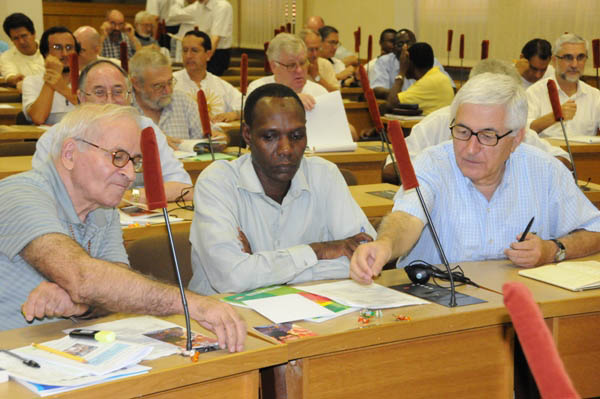Daniel Comboni
Comboni Missionaries
Institutional area
Other links
Newsletter
XVIIth General Charter of the Comboni Missionaries
The first phase of the XVII General Chapter of the Comboni Missionaries ended with the report of the General Council followed by those of the different Secretariats and the four continents where the Institute is present. Fr. Teresino Serra, in a positive and hopeful key, focused his report on three similar yet mutually connected aspects: re-foundation, requalification and the reprogramming of the Institute.
XVIIth General Charter of the Comboni Missionaries
Re-foundation, re-qualification, new plan
The first phase of the XVII General Chapter of the Comboni Missionaries ended with the report of the General Council followed by those of the different Secretariats and the four continents where the Institute is present. Fr. Teresino Serra, in a positive and hopeful key, focused his report on three similar yet mutually connected aspects: re-foundation, requalification and the reprogramming of the Institute. “Refounding ourselves,” the Superior General affirmed, “should be understood as rooting ourselves once again in Daniel Comboni, in Jesus Christ and in the Word of God, involving ourselves in the kind of transformation experienced by our Founder who, as a young Italian growing up in Verona, transformed himself firstly into a European and finally into a ‘universal’ person”.
The second aspect according to Fr. Serra - that of requalification - should be understood as “ ....reaching for a better quality of life, greater commitment in our self-giving, and more coherence in our witness to the vows” and all this even before thinking of it as a means of assessing and evaluating our commitments: “ …….coherence and commitment [radicalità] because people look at us and expect an appropriate style of life from us ” insisted the General, “Shouting slogans and filling our mouths with impressive words achieves nothing if then we run away from those missions which require patience, perseverance and hard work. We are fully aware that sharing the life of the poor and offering ourselves as their voice is our undeniable vocation”. Finally, the Superior General underlined that one of the central tasks of the Chapter would be to “.... reorganise our life and commitments according to the spirit of the Rule of Life by favouring the poorest and most abandoned in all four of the continents where we work but especially in Africa in those places where no-one else wants to go and on the new frontiers of the marginalised and excluded of society”.
Following the reports of the Superior General and the General Secretariats, delegates from the circumscriptions presented the continental reports: English-speaking Africa, French-speaking Africa, America-Asia and finally Europe. Each presentation was followed by intense group-work which allowed for a deepening of those aspects which are often left out of the main report. The African continent, cradle of the missionary vocation and the charism of the Institute, preserves ‘first evangelization’ as its defining feature. On the other hand, Africa has also become the main source of vocations to the Congregation which is thus passing more and more from a predominantly European identity to a more international one. The reports from the African Provinces have also underlined the situations of conflict and violence which are present in various nations. The critical situation facing our confreres in the Congo, Sudan and Eritrea where the violation of human rights is common-place and where the international community consciously turns a blind eye made a particular impression on the Chapter hall. Mission animation, involvement in issues of justice and peace and a meaningful presence in ‘frontier missions’ and situations of serious social marginalization marked the report of the American continent - a continent which continues to provide missionary vocations, even though not as plentiful as in the past. Asia - where the Comboni presence, even if significant, is fairly limited numerically - reported with the American continent. In Asia there are about twenty Comboni Missionaries (in the Philippines, Macao and Taiwan). They are very committed to the proclamation of the gospel in this the most populated continent of the globe.
The last report was presented by Europe, where vocations are nowadays very few, but where, on the other hand, elderly and sick Comboni Missionaries are on the increase. In spite of this, the European Provinces expressed their hopes for the future and their desire to identify new paths through which to live out the Comboni charism: mission animation carried out within and with the full collaboration of the European local churches, the internationalization of communities and most of all the determination to assume a clear commitment towards the phenomenon of immigration. As the report says: “…. it is not anymore we alone going to Africa, today it is Africa which is coming to us and we are called to answer the challenge”. In the next few days the capitulars will begin work on the ‘Discernment paper’, a document which gathers together the fruits of the reflections of the entire Institute over the past few years. It will present three main topics: the formation of the new missionaries, the structures of the internal government of the Institute and the ‘Ratio Missionis’ - a long process of study, prayer and discernment carried out by all communities and circumscriptions within the Institute.
The Communication Committee


